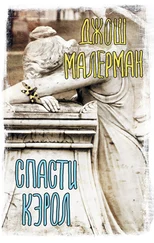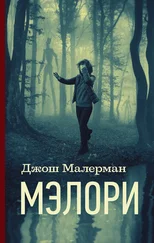J was quiet a moment. He scratched at his right elbow with his left hand. He yawned a second time.
Hysteria , he thought again. He actually made fists, as if to knock the thought out of his head. Professor Gulch taught psychology and often stressed the many ways a boy’s mind might turn on itself: mania, attention deficit, persecution, dissociation from reality, depression, and hysteria. For J, it had all sounded like distant impossibilities. Conditions to be studied for the purpose of study alone. Certainly J wasn’t afraid of one day experiencing these states of mind himself. Yet here he was…twelve years old…and how else could he explain the new, unknown feelings he’d been having of late? What would Gulch call the sense of isolation, of being incomplete, when he looked out across the Yard, toward the entrance to the many rows of the Orchard? To where the Living Trees grew?
The boy recalled his childhood as though through a glass with residue of milk upon it. Unable to answer the simple question: Where do I come from?
Another Lawrence Luxley line. A real zinger, as Q would say.
But no, J thought, there in the Check-Up room. He wasn’t trying to answer that question at all. No boy had ever determined which of the cherry trees in the Orchard were the ones they had grown on. And as far as J knew, they were fine with that.
Weren’t they?
“No,” J finally said. “I never found my way home.” He heard the pencil against paper again, could easily imagine D.A.D.’s bright science eyes reading the words he wrote.
Like all the Alphabet Boys, J felt honored whenever D.A.D. noted what he said.
“And when you woke?” D.A.D. said. He didn’t need to finish his sentence. It was clear what he was asking for.
“I thought it was real. I thought I was still out there. Like I’d woken in the Yard, on my bed. I looked up, must have seen the ceiling, but I mistook it for more of that fog. It took me a minute to understand I was just in my bedroom.” He paused. Imagined D.A.D. stroking his black beard with a gloved hand. “This all happened moments ago, of course, as the call for Inspection woke me.”
“Of course,” D.A.D. said. “Now tell me,” he began, and J knew the question he was about to be asked, before D.A.D. asked it. “Do you have a theory on what prompted this dream?”
While J had experienced a wide range of emotions in this room before, he wasn’t prepared for the one he felt then.
Fear.
And where had it come from? Surely he knew this question was coming. Had he not had time to prepare for it? Was that it? Or was it something Q would call “deeper”?
Of course J knew the right answer to D.A.D.’s question. But for the first time in his life, he didn’t feel like telling the truth.
The shock of this realization didn’t strike him as hard as the one that immediately followed: a sense that he had decided to lie before entering this room and had simply not told himself about it.
Why? Why lie?
Because, just prior to going to bed the night before, long after his studies were done, J had seen someone crouched behind Mister Tree, the lone willow that denoted the end of the Yard and the beginning of the Orchard. It was a figure, he believed. Perhaps it was the way certain branches reached down to the forest floor as others united across it, but in J’s mind’s eye, the sight he’d seen was a person.
Crouched.
By Mister Tree.
At the time, J thought it was A or Z. He couldn’t say why.
And maybe that was good enough reason to lie, J told himself. D.A.D. and the Inspectors would think he was crazy for suggesting such a thing!
A dead brother hiding behind a tree at night.
As if!
He looked from Jeffrey to Collins and thought maybe the two Inspectors could detect the hidden story. Jeffrey adjusted his cap. Collins the gold sash that ran from over his shoulder to his waist. J looked to their belts, as if that glass could penetrate his very skin, could determine the purity of his heart. Even the shepherds started breathing heavy, and one, Max, tilted his head to the side, the way dogs do when they hear a curious sound.
Hysteria. J didn’t want to sound crazy. He didn’t want to be crazy. It was branches and shadows and nothing more. Surely.
Yet, lying was a betrayal of sorts. J knew that. Perhaps, as kids, he and D had fibbed about who spilled the cherry juice on the hall carpet. Maybe once or twice, as a toddler, he’d shaken his head no when asked if he had gone to the bathroom in his pants. But these brief (and harmless, J believed, despite what lying could lead to) fabrications were easily washed clean with a single slap of that red-leathered hand. D.A.D. was very good at getting the real story out of his boys, as if he owned unseen shovels that always dug for the truth.
“J?”
J thought of Lawrence Luxley’s book about soldiers, Great Horses . Thought about one soldier in particular, a general named Sam. Sam, Q had pointed out, dressed much like the Inspectors did. A gray wool uniform that always looked too warm, no matter that the temperature seemed to gradually lower during an Inspection. A gray kepi. A gold sash and a brown belt. Black boots. All throughout Great Horses, Sam felt a similar feeling to the one J had now: Sam had information he wasn’t sure he should tell his troops. Luxley did a masterful job of highlighting this, a near twenty-page interior monologue where Sam weighed lying and lies and the right and wrong time to use them. In the end, he’d determined that no time was a good one and that his troops deserved to know the truth, even if it hurt them. But J read something deeper into that monologue than simply the merits of honesty: General Sam was scared. Not scared in the way the Parenthood had lovingly taught the Alphabet Boys to be afraid—that is, of themselves and what they were capable of doing to themselves if they did not adhere to the laws of the Turret. But rather…scared for himself.
“Why?’ he asked out loud. Both Inspectors tilted their heads like the dog had just done.
“What’s that?” D.A.D. asked.
Again, Professor Gulch’s lectures on psychology rose up like birds in J’s suddenly troubled mind.
Sam, J knew, was torn. J felt the same way, exposed beneath the bright fluorescent lights of the Check-Up room. After all, the harsh illumination showed every crevasse in the faces of the Inspectors, lines that told the boys how old these men truly were even if the sun in the Yard could not. And the reverse held true for the boys. Their youth was never as obvious as when they removed their pajamas and folded them in a pile on the end table by the door. A boy could see much more of his body in here than when he was in the shower…revelations that often alarmed him. Holding out his arm, looking down at his belly, lifting a knee, a boy could almost make out the very tunnel-and-bridge system of veins and arteries traveling beneath his skin. A pimple, normal in the hall light, could be Placasores in the Check-Up room. The light hairs on the arms looked sewn into the skin. Knuckles and toes resembled old weathered leather. Belly buttons looked like holes. Fingernails like dead wood.
And sometimes J felt like he could see even more than the unflattering details of his body. Sometimes it felt like he could see motivations in the Check-Up room, fast fleeting glimpses of the truth, whatever that might be.
“J,” D.A.D. repeated. His voice was impatience. As loving as he was to his twenty-four boys, D.A.D. was without question the most impatient man within the Turret walls. “Come now. Out with it. You have a theory for what prompted this dream.”
J recoiled at the sudden volume of his voice, as if the man had silently transported across the cold floor, his lips less than an inch from J’s ear. “Tell me.”
Читать дальше
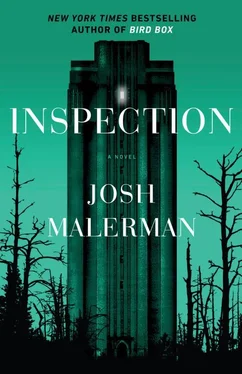
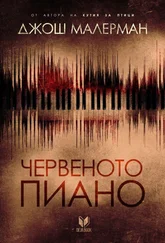
![Джош Рейнольдс - Тень в пламени [Сборник]](/books/28154/dzhosh-rejnolds-ten-v-plameni-sbornik-thumb.webp)
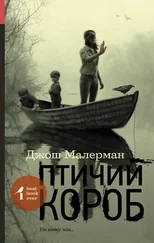
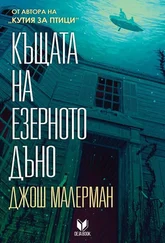
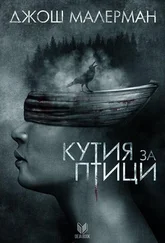

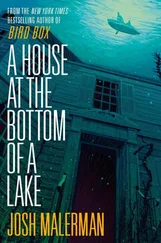
![Джош Малерман - Мэлори [litres]](/books/388628/dzhosh-malerman-melori-litres-thumb.webp)
